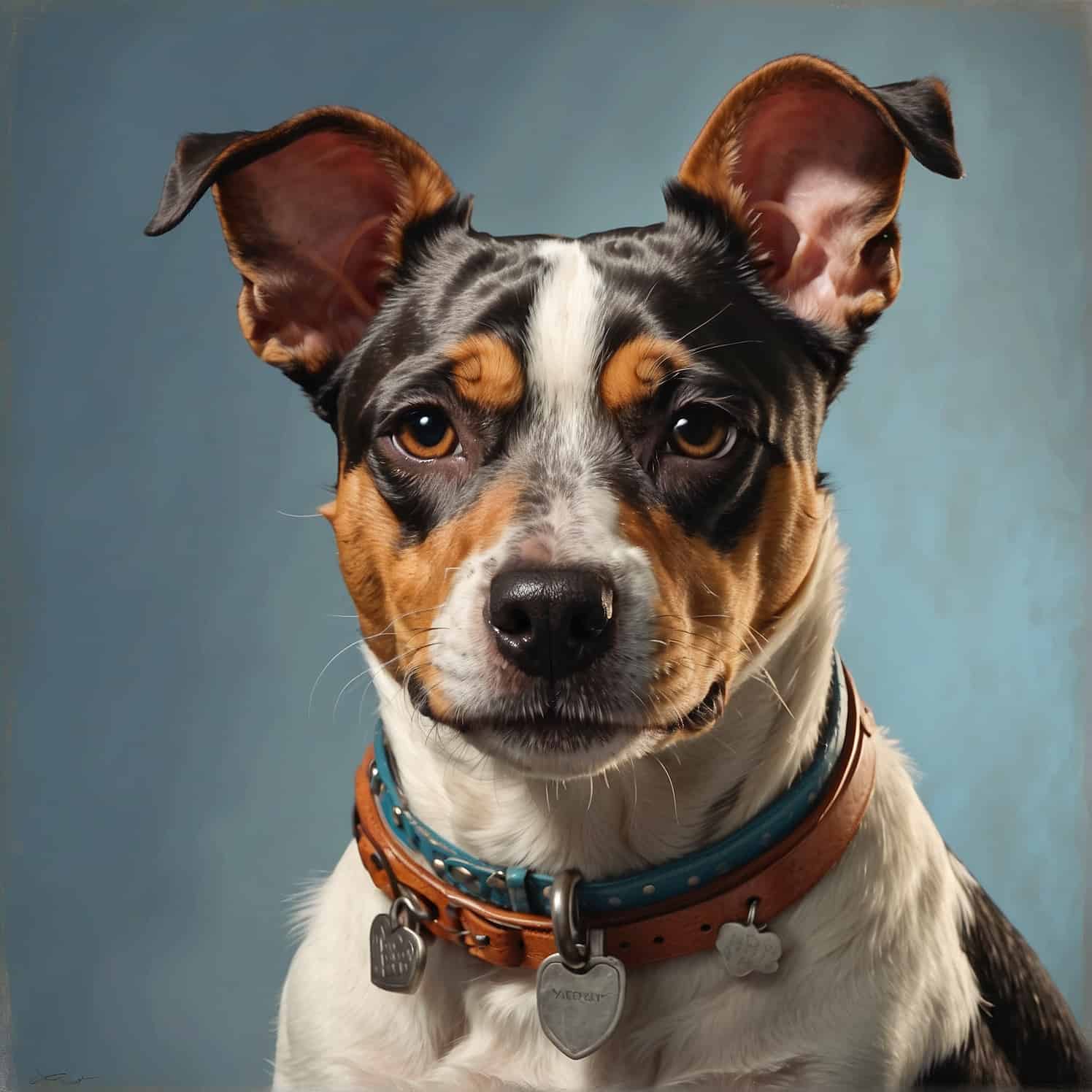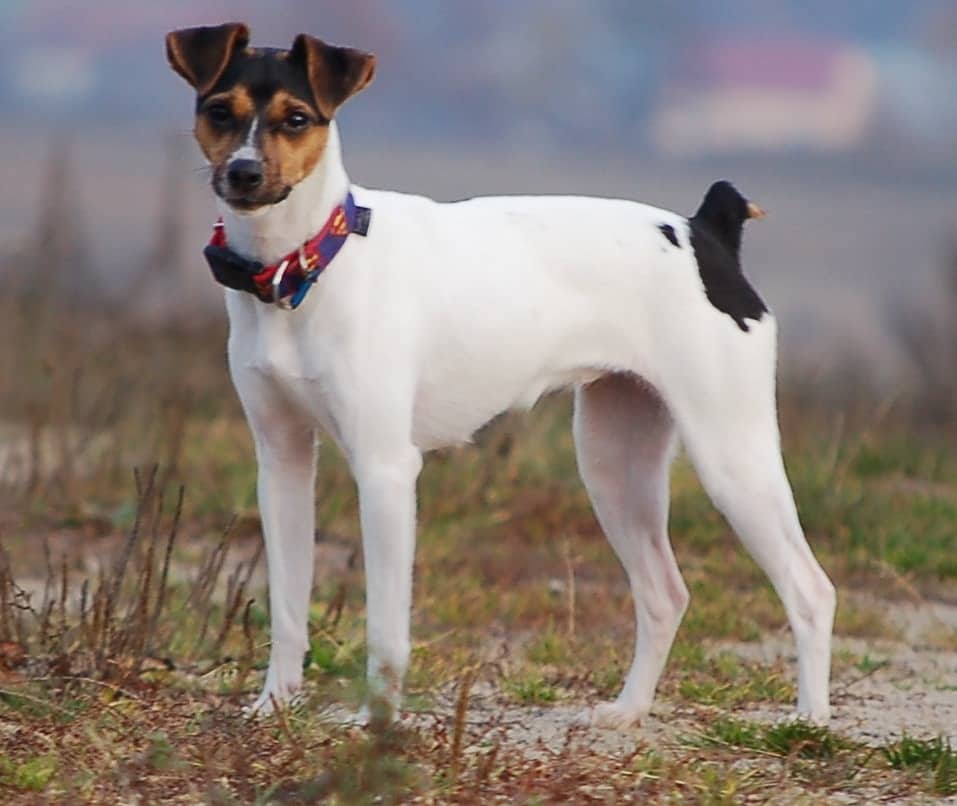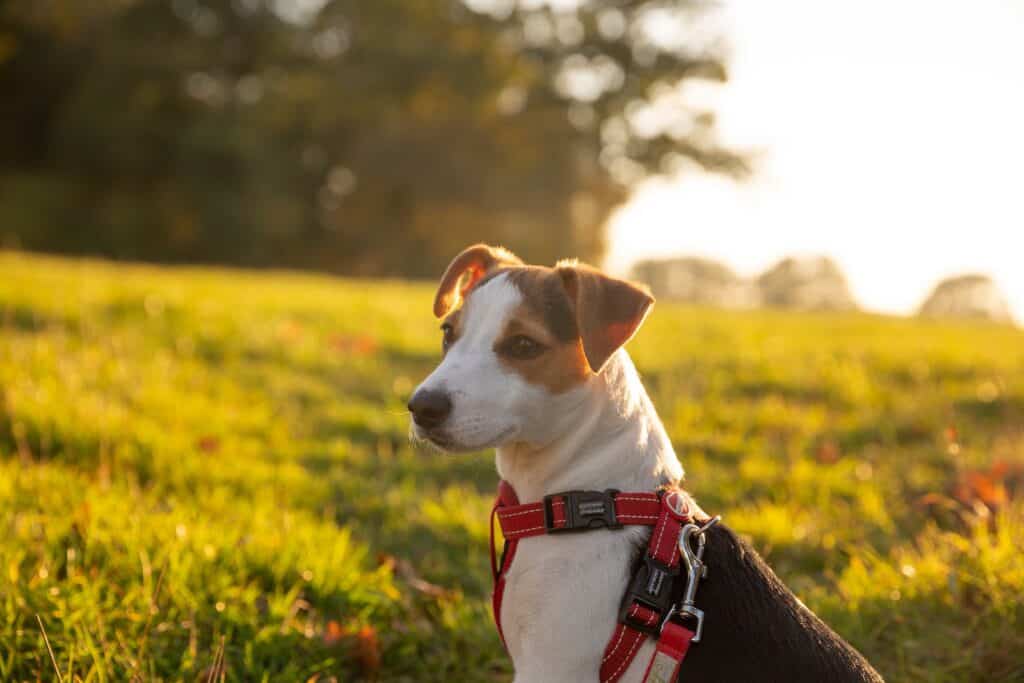Brazilian Terriers are a breed full of energy and a zest for life. Learn about their history, their care needs, and the vivacious and loyal traits that make Brazilian Terriers cherished family pets.

| Category (Explanation) | Breed Information |
|---|---|
| Year of Breed Conception | 1800s |
| Country of Origin | Brazil |
| Weight (lbs & kg) (Male) | 15-20 lbs (7-9 kg) |
| Weight (lbs & kg) (Female) | 15-20 lbs (7-9 kg) |
| Coat Type | Short, smooth coat |
| Color Variations | White with black or brown markings |
| Shedding Level (Low, Moderate, High) | Low to Moderate |
| Height (cm & in) | 13-16 inches (33-41 cm) |
| Breed Size | Small to Medium |
| Trainability (Low, Moderate, High) | High |
| Mental Needs (Low, Moderate, High) | Moderate |
| Intelligence Level (Low, Moderate, High) | High |
| Energy Level (Low, Moderate, High) | Moderate to High |
| Agility (Low, Moderate, High) | High |
| Loyalty (Low, Moderate, High) | High |
| Playfulness (Low, Moderate, High) | High |
| Exercise Needs | Regular exercise and mental stimulation |
| Guarding Proficiency (Low, Moderate, High) | Low |
| Sociability with Children (Low, Moderate, High) | High |
| Barking Level (Low, Moderate, High) | Moderate |
| Digging Tendency (Low, Moderate, High) | Low |
| Destructive Behavior (Low, Moderate, High) | Low |
| Drooling Level (Low, Moderate, High) | Low |
| Obedience Level (Low, Moderate, High) | High |
| Apartment Friendly (Yes/No) | Yes |
| Inherent Prey Drive | Moderate |
| Physical Risk to Others (Low, Moderate, High) | Low |
| Travel Fatality Risk (Low, Moderate, High) | Low |
| Allergen Potential | Low |
| Health Concerns (List of Common Health Concerns) | No specific common health issues |
| Average Life Expectancy (Life Expectancy in Years) | 12-14 years |
Woof Mastery is reader supported and our articles may contain affiliate links.
Instead of running third party ads that we have no control of we only use links from high-quality companies we are directly partnered with. Making use of these links come at no cost to you our reader, and in many cases have the extra benefit of discounted rates or sign up bonuses.
If you’re interested you can read more about our affiliate policy here.
We appreciate your support and always insure that the products and services we recommend are high-quality, helpful and relevant to the subject at hand!
The Brazilian Terrier, as the name suggests, has its origins in Brazil. It was developed in the late 19th century, primarily through the crossing of Fox Terriers with other terrier breeds and small local dogs. The goal was to create a versatile and efficient working terrier suitable for various tasks, including controlling vermin on farms and assisting in hunting.
The Brazilian Terrier quickly gained popularity in Brazil for its intelligence, agility, and friendly disposition. It became recognized as a distinct breed in the 20th century and is known for its adaptability to urban and rural environments. Today, the Brazilian Terrier is cherished both as a working dog and a loyal family companion.

Brazilian Terriers are known for their boundless energy and zest for life. Their vivacious and loyal nature makes them special companions, bringing vitality and joy to their families.
The Brazilian Terrier’s traditional role is that of a versatile working dog. These terriers have been utilized for a variety of tasks, including hunting, herding, and guarding. Their boundless energy and zest for life make them well-suited for tasks that require agility and determination. While their specific roles may vary, they are known for their loyalty and enthusiasm in assisting their human companions. As working dogs, they’ve been integral to various tasks in their native Brazil.
Brazilian Terriers are a breed full of energy and a zest for life. They are characterized by their energetic and vivacious nature. These terriers can be loving and make cherished family pets. They are known for their zest for life and require training and socialization to ensure they are well-behaved and vivacious companions.
Brazilian Terriers are known for their high energy and zest for life. They are generally affectionate and loyal to their families. However, their spirited nature can make them prone to overexcitement, and they may benefit from consistent training and socialization to channel their enthusiasm in a positive way.
Brazilian Terriers are a breed known for their small to medium-sized, sturdy build. They have a well-proportioned head with a defined stop and expressive dark eyes. Their ears are V-shaped, folded, or semi-erect, adding to their alert expression. Brazilian Terriers have a smooth, short coat that lies close to their skin and typically comes in white with patches of black, tan, or blue. Their tail is set high, often docked, and they have a jaunty, active appearance. Their overall appearance reflects their lively and spirited nature.
Brazilian Terriers may have a short, smooth coat that comes in a variety of colors. The most common coat colors for this breed include black and tan, tricolor (black, tan, and white), or brown and white. Their coat can have different combinations of these colors, often with a predominance of black and tan markings.
Brazilian Terriers typically have a smooth, short coat that comes in tricolor patterns with a white base and black or tan markings. Their coat pattern adds to their active and lively appearance.
Brazilian Terriers have a low to moderate shedding level. They have a short, dense coat that requires regular grooming to manage shedding and maintain its health. Brushing can help remove loose hair and keep their coat in good condition. While they shed minimally, attention to their grooming needs contributes to reduced shedding. Overall, Brazilian Terriers are considered to be a breed with moderate maintenance in terms of shedding.
Brazilian Terriers have a short, smooth coat that is easy to care for. Grooming habits for Brazilian Terriers include:
Brazilian Terriers have a moderate to high activity level. As a terrier breed, they are energetic, alert, and enjoy physical activities. Daily walks, playtime, and interactive games are essential to keep them mentally and physically stimulated. Brazilian Terriers may excel in activities such as agility and obedience. While they are not excessively hyperactive, regular exercise is important to prevent boredom-related behaviors. Tailor their activities to their age and individual preferences, providing a mix of physical and mental stimulation for a well-rounded routine.
Brazilian Terriers are intelligent and lively dogs. They are quick learners and respond well to positive reinforcement training. Brazilian Terriers thrive on mental stimulation and enjoy engaging with their owners in play and training sessions. Their intelligence, coupled with an energetic nature, makes them well-suited for various activities. While they may have an independent streak, their trainability and intelligence make them adaptable to different tasks and environments.
Brazilian Terriers have moderate to high mental needs. Keep them mentally stimulated with activities that challenge their intelligence, such as puzzle toys and obedience training. Regular social interaction is important, as they thrive on companionship. Provide a variety of toys and rotate them regularly to prevent boredom. Consider engaging them in dog sports or activities that allow them to use their problem-solving skills.
Enter The Woof Mastery

Before bringing a Brazilian Terrier into your home, it’s important to understand their characteristics and needs. These dogs are known for their intelligence, energy, and sociable nature. Regular mental and physical stimulation is crucial to keep them happy and prevent boredom. Training and socialization should start early to ensure they grow into well-mannered companions. Brazilian Terriers thrive in an active family environment. Potential owners should be prepared for grooming needs and committed to providing a loving, stimulating home for these intelligent and affectionate dogs.
Brazilian Terriers, with their lively and adaptable nature, generally pose a low risk to others. Proper socialization and training contribute to positive interactions. Responsible ownership, understanding individual temperament, and adherence to local regulations play crucial roles in ensuring a well-behaved Brazilian Terrier.
Brazilian Terriers can be energetic and playful, making them suitable for families with children. Supervision is important during play, and early socialization is crucial to ensure positive interactions. Teaching children how to approach and interact with the dog helps establish a positive relationship.
Brazilian Terriers may have mixed responses to water. Some individuals may enjoy swimming, while others may not be as comfortable. Introduce them to water gradually and observe their comfort level. Always prioritize safety and use a canine life vest if needed, especially in situations where they may be at risk of fatigue.
Early, positive, and consistent training forms the basis for a well-behaved and happy Brazilian Terrier as they grow into adulthood.
Brazilian Terriers may have moderate barking tendencies. They are alert and may bark to signal perceived threats or to express themselves. Early training and socialization can help manage their barking behavior and teach them appropriate times to vocalize.
Brazilian Terriers are adaptable and can live in different environments. They do well in homes with yards for play, but they can also adapt to apartment living if exercised regularly. Regular walks and mental stimulation contribute to their well-being. Brazilian Terriers thrive on companionship and enjoy being part of the family. Early socialization helps in preventing unwanted behaviors.
Brazilian Terriers, being a small to medium-sized breed, are generally adaptable to travel. Secure them in the vehicle using a crate or a suitable seatbelt harness. Monitor for signs of stress or discomfort and provide breaks for exercise. Familiar items and positive reinforcement can contribute to a positive travel experience for Brazilian Terriers.
Brazilian Terriers may be prone to specific health concerns. While not all individuals will experience these issues, it’s essential for Brazilian Terrier owners to be aware of potential health problems and work with veterinarians to maintain their pets’ well-being. Common health concerns in Brazilian Terriers include:
Regular veterinary check-ups, a balanced diet, proper exercise, and responsible breeding practices can contribute to the overall well-being of Brazilian Terriers. Owners should collaborate with veterinarians to address any health concerns promptly.
Proper nutrition is crucial for the health and well-being of Brazilian Terriers. Here are some nutritional habits and best practices to consider for this breed:
Breed-Specific Laws (BSL): Brazilian Terriers may be subject to breed-specific laws (BSL) in certain areas. These laws are often enacted at the local or municipal level and can vary widely from one jurisdiction to another.
Types of Restrictions: The specific restrictions imposed on Brazilian Terriers under BSL can include mandatory spaying/neutering, special licensing, liability insurance requirements, muzzling in public, and, in some cases, bans on ownership. The severity of these restrictions depends on local regulations.
Rationale for BSL: BSL is typically implemented based on concerns about public safety and perceived risks associated with specific breeds, often due to incidents involving dog attacks. While Brazilian Terriers are not inherently aggressive, they can be affected by BSL due to their physical resemblance to breeds that are sometimes included in these laws.
Controversy: It’s important to note that BSL is a controversial topic. Critics argue that it unfairly targets breeds rather than addressing individual dog behavior and that responsible ownership and training should be emphasized instead of breed-specific restrictions.
Local Regulations: To determine if there are breed-specific laws or restrictions regarding Brazilian Terriers in your area, you should check with your local animal control or government authorities. Be aware of and comply with any local regulations to ensure that you are in compliance with the law while owning a Brazilian Terrier.
Woof Mastery is reader supported and our articles may contain affiliate links.
Instead of running third party ads that we have no control of we only use links from high-quality companies we are directly partnered with. Making use of these links come at no cost to you our reader, and in many cases have the extra benefit of discounted rates or sign up bonuses.
If you’re interested you can read more about our affiliate policy here.
We appreciate your support and always insure that the products and services we recommend are high-quality, helpful and relevant to the subject at hand!
Myth 1: Brazilian Terriers are overly energetic and require excessive exercise.
Truth: While they are active dogs, Brazilian Terriers do well with moderate exercise. Regular playtime and mental stimulation are essential, but they don’t necessarily require extreme physical activity.
Myth 2: Brazilian Terriers are aggressive towards strangers.
Truth: Brazilian Terriers are typically alert and make good watchdogs, but they are not inherently aggressive. Proper socialization from an early age can help them be friendly and well-behaved around strangers.
Myth 3: They are challenging to train due to stubbornness.
Truth: Brazilian Terriers are intelligent and can be trained with positive reinforcement. Consistent and patient training methods work well with this breed.
Myth 4: Brazilian Terriers are not suitable for families with children.
Truth: With proper socialization, Brazilian Terriers can be good family dogs. They are known for their affectionate nature and can form strong bonds with children.
Myth 5: They are prone to excessive barking.
Truth: Brazilian Terriers may bark to alert their owners, but excessive barking is not a universal trait. Training and socialization can help manage their vocal tendencies.
These myths highlight the importance of understanding the individual characteristics of Brazilian Terriers and the role of training and socialization in shaping their behavior.
Famous Brazilian Terrier examples are not as widely documented, but these energetic and loyal dogs can be found as beloved pets in homes where their playful nature is appreciated.
The Brazilian Terrier holds cultural significance in various domains:
The Brazilian Terrier, a versatile and energetic breed, does not have a widely recognized historical owner. However, these terriers have gained popularity in Brazil and beyond for their agility and companionship.
Brazilian Terriers, like many breeds, have faced challenges over the years. Some notable challenges include:
The Brazilian Terrier is a terrier breed that originated in Brazil. It is believed to have been developed from a combination of terrier breeds, including:
Brazilian Terriers, with their energetic and social nature, make wonderful companions. Known for their loyalty and adaptability, they integrate well into family life. Their moderate size and short coat make them suitable for various living conditions. Brazilian Terriers thrive on interaction and engage actively in play. With proper training and socialization, they become affectionate members of the family, bringing joy and liveliness to the household.